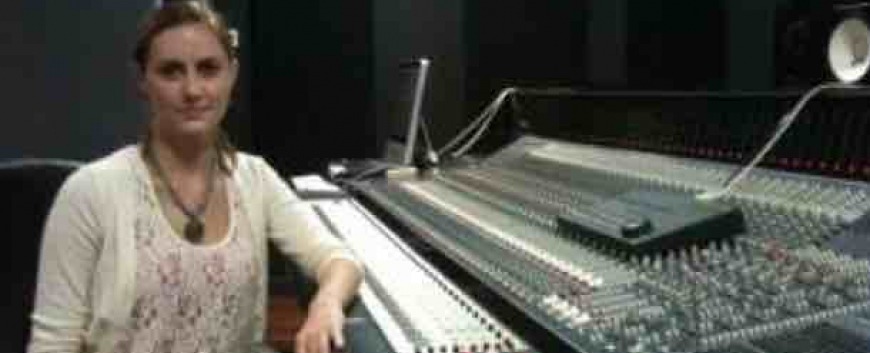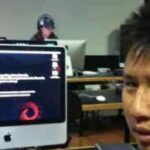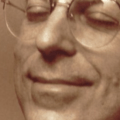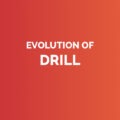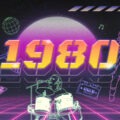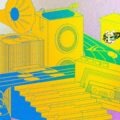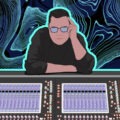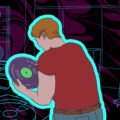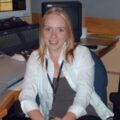Hazel Burns turns her passion for music and mixing into a Career at CTV and Discovery Channel.
With an impressive education and music performance credentials, Hazel Burns decided to shift her career focus to Sound and Music Recording, enrolling at RAC’s Montreal campus. Hazel explains how she came to that critical choice, and how that decision helped her land a job at CTV as a mix engineer, as well as result in being chosen to record and mix several acclaimed projects.
What is your background?
I have a classical music background as both a pianist and singer. I originally studied classical voice at the University of Victoria, which is where I got my first taste of music technology and recording. After spending several years singing in an opera company, I decided that life as a starving musician wasn’t for me and I turned my focus towards sound recording. This career path was a better fit for my personality since I’ve always enjoyed technology and I love the freedom I now have to work creatively in many musical and artistic genres beyond just my own instrument. In 2006, I completed RAC Montreal’s Sound and Music Recording course, which gave me great hands-on and theoretical experience in post-production, live sound and studio environments. Afterwards, I was accepted into McGill University’s Masters in Sound Recording program, which focused mainly on classical recording techniques and microphone placement and was a nice complement for both my music background and my studies at RAC. Both during and after my Masters studies I worked for the Banff Centre’s Audio Department where I began to further focus my career on classical producing. I’ve recently moved to Toronto where I am currently working as a mix engineer in CTV’s Post Sound department as well as running my own freelance recording business, Silencio Recordings.
What kind of music projects did you start out with at the beginning of your career?
When I first started out in sound recording I did anything and everything I could to gain experience in the industry. These jobs were very diverse and almost always unpaid. Some highlights include recording a bee farm for the local museum, doing live sound for a musical- theatre company, editing transcriptions of an academic conference, doing Foley sound for an online video game, working as a boom operator on an independent film, and recording friends’ bands with whatever gear I could piece together. No matter what I was doing, every job taught me something.
Describe the current studio you work in, and how you ended up working there?
I currently work in CTV’s Post Sound department, which has five main post-production studios and several smaller studios. These studios vary a bit depending on their uses, but the main ones run Pro Tools 10 HDX and are fully 5.1 capable. One of the fun things about working for CTV is that everything is mixed in surround. All of the studios have a control surface, mainly we use C24’s and Control 24’s, but our newest studio has an Icon. I first worked for CTV in 2009 when I was hired to assist with the recording of the Vancouver 2010 Olympic Games theme music, which was done in Montreal. When I later moved to Toronto in 2011, they hired me as a summer student and I then moved up to an engineer position.
What is your role at the studio?
Due to my strong music background, my main role at CTV is to conform, edit and mix the music for each episode of Discovery channel’s “Mighty Ships,” “Mighty Planes” and “Nerve Center” series. Recently, I’ve started mixing full episodes of the shows, which includes editing/mixing the on-camera dialogue, narration, sync sounds, and building FX and ambiences when needed. Past projects I’ve worked on at CTV were recording the live descriptive video narration for “So You Think You Can Dance,” mixing the “Mighty Planes” music library and doing sound design for the “Daily Planet” HD screen graphics.
How’s the music scene (in Toronto)?
Since I’m pretty new to Toronto, I’m still forming my opinion of its music scene, so my views will probably change as I get to know the city better. So far, I find that with the exception of CBC (which few local musicians can afford to record with), there doesn’t seem to be much of a classical music recording scene in Toronto compared with what’s going on in Montreal. I was shocked to find that it isn’t even possible to rent omni-directional microphones here, which are a staple for any classical recording. Considering that Toronto is home to the Royal Conservatory of Music and several other well-respected music schools, there is a lot of talent in this city, but it seems that the majority of musicians either make their recordings elsewhere or import out- of-town classical engineers for their projects. Since I’m primarily a classical engineer, I’d like to see that change and I’m hoping I can make a name for myself here with the local musicians. As far as popular music goes… sorry, that’s not my scene!
How have things changed in the last few years?
The most significant thing that has changed in my generation of engineers compared to the generation that trained me is that there are no longer big recording studios and record companies anymore. This not only makes it much more difficult to find work as an engineer, but it also means that we have lost the mentorship tradition of experienced engineers passing on their knowledge and “tricks of the trade” in the workplace. The result is that this generation of engineers must look harder to gain the knowledge and skills needed since there is limited opportunity to learn on the job. With recording technology now so easily accessible, there is a new generation of self-taught engineers who have the gear, but lack the basic studio knowledge they need. In some respects recording schools have replaced the studio mentorship tradition, but it is still important for young engineers to search out those opportunities to learn from people with real industry experience. Another result of losing the big recording studios is that now engineers must also be entrepreneurs. Currently, I don’t know a single sound engineer who isn’t working for themselves in some capacity. Now it’s not enough to just be a good sound engineer, you must also possess the people and business skills to find work on your own and run your own company.
What are your personal goals and ambitions?
Long term, short term…
In the short term I am working to establish myself and make connections in Toronto’s music and recording scenes. At this point my goal is to stay busy as a sound engineer and work in as many different areas as I can. In the long term, I’d love to make a name for myself as a classical engineer and producer and I hope to continue to learn and be inspired by this industry.
Do you have any suggestions for people interested in starting a career in audio or music?
This career can be very rewarding due to the creativity and freedom it allows you, but don’t go into it unless you’re sure it’s something you’re passionate about because it requires long hours, lots of hard work and you’re not going to make a lot of money doing it. Be realistic in your expectations, you’re not going to start at the top, but if you’re willing to put in the work and you have a good attitude, you’ll go far. Though there aren’t many big studio jobs anymore, there’s still a lot of opportunity if you’re innovative with your skills and you know how to market yourself. Above all, make connections with people! In this industry you’re not hired for your skills – everyone assumes you have the skills – you’re hired because people know you and like working with you. I don’t know anyone who’s gotten an industry job through a blind resume and every job I’ve gotten has been through a personal connection.
How was your experience at RAC? Did anything particularly influential happen during your time at RAC?
Overall, I had a very positive experience at RAC. I learned a lot of information and gained tons of hands-on experience in a relatively short period of time. The teachers and staff were very helpful and actively looked for work opportunities for us, which made me feel that they really wanted us to succeed. Not knowing anyone in Montreal when I moved there, the environment at RAC was comfortable and welcoming and I formed lasting bonds with the other students. When I expressed interest in applying for McGill’s Sound Recording program, the teachers wrote my letters of recommendation and supported me through the process. I feel that my time at RAC really helped to prepare me for the professional world as their studios, boards and equipment are exactly like the types of environments I now work in professionally.
Any recording session experience that was particularly memorable?
Several years ago I engineered a contemporary classical album of an ensemble playing Schoenberg’s “Pierrot Lunaire,” which is a work for soprano, piano, flute/piccolo, clarinet, violin and cello. Since these instruments are sonically very different and not normally played together as a small ensemble, it was a challenge figuring out how to organize the musicians in order to create a balanced recording where none of the instruments overpowered each other. I ended up placing the instruments in a semi-circle formation with the piano at the back and the soprano in the centre. I spent a lot of time adjusting microphone heights and angles before I was happy with the balance and I used a pair of Coles 4038 ribbon microphones as a stereo pickup for the voice, which made it sound huge. This project sticks out in my mind as being unusual because typically there would be a team of engineers, whereas for this recording, I was working alone for a producer. Normally, this would have made the job very stressful, but the musicians and producer were of such a high calibre and so easy to work with, that it was probably the most relaxing album I’ve ever recorded. On top of that, I was really happy with the end sound and because of the contemporary subject matter of the piece (it’s about a clown going crazy) I got to be very creative with reverb and panning effects during the mix, which is not normal for classical music.
Any person or group that has really impacted you or your work?
I’m very fortunate to have met many brilliant people in the industry who have impacted me over the years. However, the person that stands out as the most influential to my career is Theresa Leonard, a brilliant producer and the director of the Audio program at the Banff Centre. She was the first one to encourage me towards classical producing and she mentored my development. Because of her I’ve had the opportunity to engineer and produce albums with some stellar musicians. She further nominated me for the “MusiCounts Fred Sherratt Award for Outstanding Achievement in Music and Recording Arts and Sciences,” which I received in 2011.
